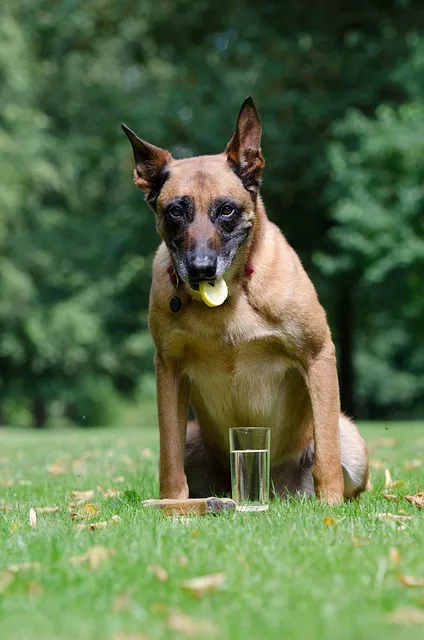The Belgian Malinois is an extremely intelligent breed that is highly energetic and exhibits the essence of good health.
With regular wellness visits, good nutrition, and exercise, this breed can easily have a life expectancy of twelve to fifteen years.
A striking dog, the Belgian Malinois has stunning looks and this breed suffers from few health problems and conditions.
Owners do, however, notice symptoms that can be related to food allergies and sensitivities in the breed.
If you’re considering getting a Belgian Malinois or you do own one, it’s best to know the signs of food allergies.
Having food allergies may not seem worrisome but it can cause weight loss, a variety of skin issues, and disturbances and affect your pup’s quality of life.
In this post, I will focus on food allergies and answer the question, “what do Belgian Malinois eat? Also, I will add some information on the Belgian Malinois raw diet. Grab a snack and your pup and read on, just make sure the snack is a healthy one!

For your dog’s vitamin supplement, food, toys, or other dogs product please visit the Sundays for dogs website.
What Does Belgian Malinois Eat?
A Belgian Malinois, just like any other breed, will eat whatever you feed them, especially junk food like we do. That is sort of a smart-aleck answer, but very true.
Most humans are driven to bad foods like a magnet because they are made to taste yummy and thus we love junk. The more we eat, the more we crave it.
The same goes for our dogs, which we are responsible for feeding. If we give them junky dog treats of poor quality or the terrible snacks we often eat, they’re hooked, just like us. It is like an addiction.
What a Belgian Malinois should be eating are foods that have lean meat ingredients such as chicken, fish, or beef with added vegetables like green beans and carrots.
Various vitamins, minerals, and healthy Omega 3 fats are needed as well to keep them in tip-top shape for their very active lifestyle, see the best dog food for Belgian malinois.
Fruits and other vegetables may be added, but just be sure they are suitable for canines. Some can be poisonous to dogs, so do some research before offering.
If you want to feed your pup commercial dog food, make sure that it is high quality and has all the essentials for your Malinois. for dog food products and vitamin supplements please visit the site health extension.
Belgian Malinois Food Allergies, Intolerances, and Symptoms
Food or environmental allergies are an exaggerated response to a substance that causes problems and would not normally bring about an issue in another dog.
It is their body’s way of attacking that foreign substance and causing symptoms. Allergies can be confused with food sensitivities which can also cause a reaction that is more gradual and less severe than an allergy.
The following are some Belgian Malinois food allergy symptoms
- Diarrhea
- Vomiting
- Ear infection
- Foot infection
- Itching can lead to scratching. This can become a vicious cycle as the scratching goes on to loss of fur, flaky skin, and even skin infections from excessive scratching.
The more common culprits of these symptoms are
- Fish
- Pork
- Rabbit
- Lamb
- Beef
- Soy
- Wheat
- Dairy.
Sometimes you will know immediately what the offending allergen is or you may have to search through the ingredient list to try and figure it out.
Symptoms could also be from table scraps or a human treat you’ve fed them, which would be an easy clue or you may have to delve into some detective work.
Your veterinarian may be able to help with blood or allergy testing and there are dermatology veterinarians to help with skin-related issues if you are at the end of your rope.
To check your Belgian Malinois health status or their DNA, please visit the Embark vet website for all the help you may need.
Foods For Your Belgian Malinois
Oftentimes you associate allergies with sniffling, sneezing, and a stuffy runny nose. In dogs, allergies generally appear with GI symptoms, skin issues, or both. Your poor pup may suffer from gas or belch and loose stools may occur.
Constant itching, leading to scratching is another sign and can lead to fur loss, horribly rash irritated skin, and finally skin infections. This cycle needs to be broken for your pup’s health and for your own sanity.
If itching spreads to feet, groin, armpits, legs, eyes, and ears, this most presumably is an allergy. Itchy ears can lead to ear infections also.
Your pup may only be eating a portion of food for a few months when symptoms may appear, but they can also be enjoying food for even two years when there is a sudden onset of symptoms, which become “fast and furious.”
If you are planning on feeding your Belgian Malinois regular commercial dog food, first see what their breeder has been feeding them.
If they have been feeding them high-quality puppy food that contains adequate amounts of protein, vitamins, minerals, and healthy fats with little to no additives, you may want to stick with this food.
Your puppy should also be thriving on this food, growing in their weight range, and exhibiting good health with clear skin and a shiny coat.
If they continue to do well on this food simply switch to the adult version when they are old enough.
When your Belgian seems to be having health issues that appear to be allergies, consult your veterinarian and use a trial and error method or switch to a food that is specifically for a breed with food allergies.
These foods have well-known allergens eliminated. There are many highly recommended dog foods out there today that have only the best ingredients and limited fillers.
The fewer ingredients, the better. As they say, “less is more.” See the collection of the best dog food for the Belgian Malinois.

Belgian Malinois Raw Diet
Because canines, now domesticated, evolved from wolves, many believe they are suited to a raw diet based on prey like wolves hunt and eat and which also contains plenty of protein.
A dog’s digestive system has not changed that much in years and is not designed to digest carbohydrates, especially those that are starchy such as lentils, peas, and legumes which can be found in some dog foods.
This can negatively affect their systems from insulin production to creating inflammation in their bodies and, in turn, can lead to disease.
A raw diet is much better for your Belgian Malinois’s weight, immunity, and gut health. Many diseases are linked to human as well as canine gut health.
Good bacteria are very important for a healthy stomach and can be easily destroyed by an inflamed diet that can lead to a variety of ailments such as arthritis, diabetes, digestive problems, food allergies, and anaphylaxis.
If you decide to feed your pup a raw diet, consult their veterinarian first. When preparing their food yourself, you will need some guidance, perhaps a book that can steer you in the right direction.
You can also purchase pre-made raw dog food and treats, just check out reviews on the companies to make sure it’s as healthy as advertised.
You may also need to give your Belgian Malinois supplements to ensure they are getting all of their essential vitamins, nutrients, and minerals.
Keep in mind that this raw diet will be costlier than most commercial dog foods, but can be a big benefit. Listed below are definite perks to a raw diet.
- Weight – helps maintain a healthy weight
- Energy – protein-rich diet keeps your Belgian active
- Immunity – a raw diet boosts immunity
- Gut health – good gut health = good overall health
- Healthy skin and coat – proper nutrition inside means healthy skin and a shiny coat outside with no itchy, flaky skin
- Better smell – yes, poor digestion often causes bad breath and flatulence, and no doggie odor with a raw diet
Whichever diet or type of food you choose to feed your Belgian Malinois make sure it is a portion of good quality food that is nutritious and suits all of their needs.
To avoid food allergies, a raw diet is an excellent choice or a brand of dog food that contains only good ingredients, keeping any extras to a minimum, see the list of dog food for skin allergies that helps with Sensitive Stomach and Skin allergies.
Good nutrition is one of the steps to ensure that your Belgian Malinois is healthy, leading to longevity and excellent quality of life.